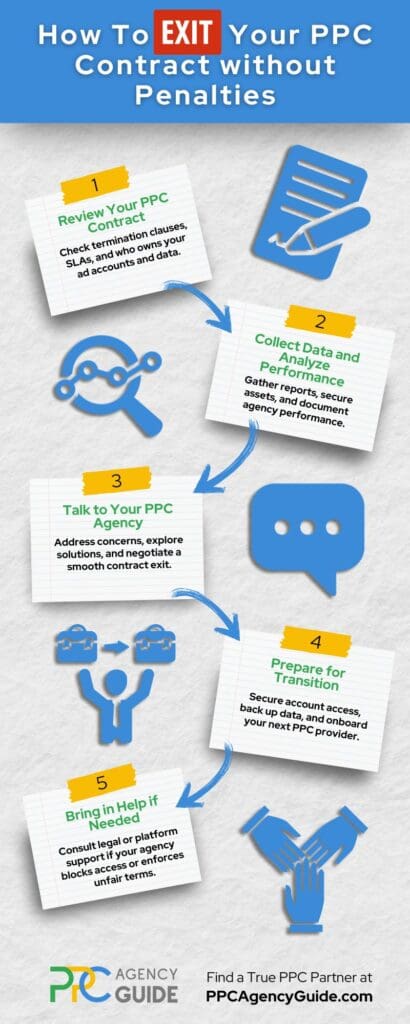
Are you ready to bring your pay-per-click advertising (PPC) in-house, or are you frustrated with an agency that’s underperforming, overcharging, or failing to communicate? Businesses may leave agencies for lots of reasons, and most of the time, it’s a smooth process. However, sometimes there are roadblocks when terminating PPC agreements, or businesses just want to prepare for the absolute worst-case scenario. We get it. In this step-by-step guide, we’ll cover everything from negotiating your exit to securing your accounts so you can close this chapter with confidence.
Step 1: Review Your PPC Contract
Before making any moves, you need to understand what you agreed to. Your contract is the foundation of your relationship with the agency, and it will dictate whether you can leave freely or if you are locked into a commitment.
Some contracts make it easy to exit with a simple notice period, while others include penalties, retainers, or restrictive clauses that make it difficult to walk away. Even if your agreement seems clear, small details like who owns your ad account and data can impact your transition.
Key Terms That May Affect Your PPC Exit Strategy
- Termination Clause: This section outlines how and when you can leave the contract. Some agencies require a notice period of 30, 60, or 90 days, while others may charge a fee for early termination. If no termination penalties are listed, you should be able to exit without financial consequences.
- Service Level Agreement (SLA) Violations: If the agency committed to specific performance benchmarks or deliverables and failed to meet them, you may be able to terminate without penalties, even if there is a termination clause. Look for any clauses that tie agency compensation to performance metrics.
- Ownership of Data and Assets: Review whether you or the agency owns your advertising accounts, historical data, and creative assets. If the agency owns them, you may need to negotiate access or risk losing your campaign history. Ideally, your business should have full control of all advertising accounts and any tracking pixels.
- Refund Policies and Prepaid Fees: Some agencies require businesses to prepay for services or ad spend. If you paid upfront for services that have not been provided, review whether the contract allows refunds. If refund terms are unclear, you may need to negotiate.
- Retainer or Minimum Spend Requirements: Certain agencies require a minimum monthly spend or a fixed-term commitment. If your contract includes these conditions, leaving early may result in additional charges or forfeited payments.
- Regional Contract Differences: The laws governing business contracts differ by country. In the United Kingdom, unfair contract terms may allow businesses to exit restrictive agreements. In the United States and Canada, contracts are generally enforceable unless termination clauses provide an exit path.
What if Your Contract Does Not Include an Exit Clause?
If your contract does not specify a notice period, termination fees, or other restrictions, you should be able to exit your PPC contract without penalties. In this case, it is still best to document your reasons for leaving and ensure a smooth transition before officially ending the relationship.
Even if your contract does include restrictive clauses, some agencies are willing to negotiate an early exit, especially if they have not met their obligations or if keeping you on as a dissatisfied client is not worth the trouble. You’ll learn more about how to deal with these types of situations in just a moment.
Step 2: Collect Data and Analyze Performance
Once you understand your contract, the next step is to gather evidence that supports your decision to leave. Whether you are dealing with poor performance, lack of transparency, or unfulfilled promises, having clear data will strengthen your case, especially if you need to negotiate your exit or prove a breach of contract.
Even if you do not plan to dispute anything, now is the time to secure your data. If negotiations go south, you do not want to lose access to critical information that could affect your next PPC campaign.
Common Reasons for Exiting PPC Agreements and What to Look For
- Poor Performance and ROI Concerns: If your return on ad spend is too low or your leads are unqualified, check how your campaigns have been managed. Compare key metrics like conversion rate, cost per lead, and customer acquisition cost over time. If your contract includes performance guarantees, look for areas where the agency failed to deliver.
- SLA Violations: If your contract specifies response times, reporting frequency, or performance benchmarks, look for areas where the agency has not met those obligations. Missing reports, delayed responses, or poor communication could be considered breaches of contract.
- Lack of Transparency or Account Access: If the agency controls your Google Ads, Meta Ads (Facebook and Instagram), LinkedIn Ads, or other accounts and refuses to give you full admin access, that is a major red flag. You should also check whether they have been transparent about ad spend allocation and campaign performance. If you cannot see how your budget is being used, you need to take action before leaving.
- Failure to Follow Agreed-Upon Strategies: If the agency is not implementing the strategies you discussed or is running campaigns that do not align with your business goals, pull reports on campaign settings, targeting, and ad creatives. Compare what was promised with what is actually running.
- Suspicious Activity or Black Hat Practices: If you notice sudden spikes in ad spend, poor-quality traffic, or unusually high click-through rates with no conversions, you may be dealing with fraudulent activity or low-quality ad placements. Review your traffic sources and conversion data to identify any irregularities.
Data You Should Secure Before Terminating PPC Agreements
Regardless of why you are leaving, you need to collect copies of all essential data before having a conversation with your agency.
Campaign Performance Reports: Download reports showing key performance indicators, including conversion data, cost per lead, and return on ad spend.
- Ad Creative and Copy: Save copies of all active and past ad creatives, headlines, descriptions, and display assets.
- Keyword and Audience Lists: Export keyword lists, negative keywords, retargeting audiences, and lookalike audiences.
- Google Tag Manager and Analytics Data: Ensure you have access to Google Tag Manager, Google Analytics, and any tracking pixels used for conversions.
- Invoices and Billing History: Collect invoices and transaction records for ad spend, management fees, and any additional charges.
If your agency resists sharing data, that is a sign you need to secure your account access immediately.
Step 3: Talk to Your PPC Agency and Negotiate Your Exit
Now that you have reviewed your contract and gathered your data, it is time to have a conversation with your PPC agency. Even if you are certain that you want to leave, approaching this discussion professionally can make the PPC contract termination process smoother and reduce the chances of unnecessary conflict.

Some agencies are open to negotiating an early exit, while others may try to retain you by offering solutions. In either case, going into the conversation with a clear objective and supporting data will help you stay in control.
How to Approach the Conversation
- Start With Your Concerns, Not Accusations: Open the discussion by outlining your concerns based on data rather than making it personal. For example, instead of saying, “Your agency is not delivering results,” say, “Over the last three months, our cost per lead has increased by 40 percent while conversions have dropped. Can we talk about why this is happening?”
- Listen to Their Response: Some agencies may have insights that explain performance issues or offer adjustments that could resolve your concerns. If they are open to making changes that align with your business goals, staying on board may be worth considering.
- Discuss Contract Terms If You Still Want to Leave: If you have identified a termination clause, SLA violation, or another contractual reason for exiting, bring it up. If your contract does not include penalties, you should be able to leave freely. If penalties apply, ask whether they are flexible on terms. Some agencies will waive fees rather than force an unhappy client to stay.
- Get Commitments in Writing: Whether you are staying or leaving, ensure that any agreements or adjustments discussed in the meeting are confirmed in writing. This protects you in case there are discrepancies later.
When Staying Might Make Sense
While you may be frustrated with your agency, there are situations where continuing the partnership could be beneficial.
- Performance Issues Are Recent: If your PPC results have declined, but the agency has a strong past track record, discussing a strategy shift could help resolve the issue.
- The Agency Is Willing to Adjust the Contract: Some agencies may allow you to move to a month-to-month agreement, reduce fees, or revise their strategy to better align with your goals.
- Leaving Mid-Campaign Would Cause Disruption: If you are in the middle of a high-value campaign, transitioning too soon could impact results. In this case, planning an orderly exit may be the better option.
Signs You Should Leave Immediately
While it is worth considering all options, there are clear red flags that signal it is time to walk away.
- You Do Not Have Full Access to Your Accounts: If your agency refuses to give you admin access to your ad accounts, analytics, or tracking tools, you need to take control of your assets before terminating the contract.
- There Is a Pattern of Poor Communication or Unfulfilled Promises: If your agency repeatedly misses deadlines, fails to follow agreed-upon strategies, or provides unclear reporting, staying longer will likely not change the situation.
- You Suspect Fraudulent Practices: If there are unexplained budget increases, suspicious traffic sources, or other black hat tactics in play, exiting quickly is the safest option.
Step 4: Prepare for Transition (Whether You Stay or Go)
Once you have spoken with your PPC agency and decided to move forward with termination, your next priority is ensuring a smooth transition. Whether you are switching to a new agency or bringing PPC management in-house, the goal is to maintain control of your accounts and avoid disruptions in performance.
This step is critical because some agencies, particularly those losing a client, may not make the transition easy. Securing your data, verifying access to all accounts, and having a plan in place before the official exit ensures you are not left scrambling.
Ensure You Have Full Access to Your PPC Accounts
Before finalizing your departure, confirm that you have full administrative access to all platforms and assets.
- Google Ads and Microsoft Ads: Log in and verify that you are listed as the primary admin. If the agency owns the account, you may need to create a new one and transfer data.
- Meta Ads: Ensure you have control of the business manager account, ad accounts, and pixel tracking.
- LinkedIn Ads and Other Platforms: If you are running ads on LinkedIn, Twitter (X), or other platforms, verify ownership of the accounts and campaign data.
- Google Tag Manager and Google Analytics: If tracking tools are controlled by the agency, request access to prevent data loss.
If your agency refuses to transfer ownership of accounts, this could be a major roadblock. Some agencies set up PPC accounts under their own business manager rather than the client’s, which can make transferring ownership difficult. In this case, you may need to escalate or rebuild accounts from scratch.
Secure and Back Up Critical PPC Data
Even if your agency is cooperative, it is best to download and save key data in case anything is lost during the transition.
- Campaign Performance Reports: Export reports showing conversion trends, cost per acquisition, and return on ad spend.
- Keyword and Audience Lists: Save targeting details, negative keywords, and custom audiences for future campaigns.
- Ad Creative and Copy: Back up images, videos, ad copy, and landing page URLs used in your campaigns.
- Billing and Invoices: Retain a record of past ad spend and management fees for reference.
Set Up Your Next PPC Management Solution
Once you have secured your data and access, it is time to set up your next PPC strategy.
- If Transitioning to a New PPC Agency: Choose a provider that offers full transparency and clear reporting and ensures you own your ad accounts.
- If Managing PPC In-House: Ensure your team has the right training, tools, and experience to take over campaign management.
- If Pausing PPC Temporarily: Monitor site traffic and lead flow to assess how the change affects your business.
If you are switching agencies, coordinate the transition to avoid downtime. Have your new provider review past performance data, optimize existing campaigns, and implement new strategies before fully cutting ties with the old agency.
Watch for Red Flags During the Exit Process
Most reputable agencies will facilitate a smooth transition, but in some cases, agencies that feel they are being replaced may take actions that make things more difficult.
- Account Lockouts: Some agencies remove access or revoke admin permissions, making it difficult to take control. Secure access before finalizing the termination.
- Data Deletion or Tampering: If the agency has full control over accounts, they may delete campaigns or alter settings before handing them over. Download reports and take screenshots as a backup.
- Unexplained Budget Spikes: In rare cases, agencies may increase ad spend or run unnecessary campaigns in the final days of a contract. Monitor activity closely until the transition is complete.
Finalizing Your Exit
Once everything is in place, confirm with your agency that your contract is officially terminated and request written confirmation of the agreement. If any issues arise, having documentation of your requests, account transfers, and communications can be helpful in case you need to escalate the situation.
Step 5: Bring in Help if Needed
If your PPC agency refuses to cooperate, enforces unfair contract terms, or creates roadblocks during your exit, it may be time to bring in professional help. While most agencies handle contract terminations professionally, some may use tactics to delay, withhold data, or charge excessive exit fees. Knowing your options can help you navigate disputes and ensure a fair resolution.
When to Seek Outside Assistance
- The Agency Is Withholding Account Access or Data: If you do not have administrative control over your ad accounts and the agency refuses to transfer ownership, you may need legal or platform-level intervention.
- The Agency Is Enforcing Unfair Penalties or Fees: If you are being charged excessive termination fees or forced to continue services against your will, contract law professionals can help determine if the agency’s terms are legally enforceable.
- There Are Signs of Fraudulent Activity: If your agency has engaged in suspicious practices such as click fraud, budget misallocation, or artificially inflated performance reports, an independent PPC consultant can audit the account and provide evidence.
- The Agency Is Damaging Your Brand Reputation: If the agency is posting misleading claims, refusing to remove access to your brand assets, or threatening legal action, a reputation management service or attorney may be necessary.
Who Can Help
- A Contract Lawyer: If the dispute involves contract enforcement, penalty clauses, or withheld refunds, a business attorney can help negotiate terms or escalate legal action.
- A PPC Consultant: If you need an expert to audit your account, prove an agency’s breach of contract, or assist in the transition, a consultant with platform experience can help.
- A Mediation or Arbitration Professional: If your contract includes a dispute resolution clause, an independent mediator can help facilitate a fair agreement.
- Google, Meta, or Platform Support Teams: If you believe an agency is violating platform policies or engaging in unethical practices, contacting the advertising platform directly may help you regain control of your accounts.
How to Escalate the Situation
If negotiations with your agency are not progressing, consider the following steps.
- Request a Formal Contract Review: Have a legal professional examine your agreement to determine whether the agency is violating terms or enforcing unfair penalties.
- File a Complaint with the Advertising Platform: If the agency is engaging in deceptive practices, platforms like Google Ads and Meta Ads may take action against them.
- Publicly Document Your Experience (As a Last Resort): Some businesses choose to leave honest reviews or file complaints with consumer protection organizations if an agency refuses to comply with ethical business practices.
Protecting Yourself for the Future
Once you have successfully exited your PPC contract, it is important to learn from the experience to avoid similar issues in the future.
- Use Month-to-Month Contracts When Possible: This gives you flexibility if an agency is not meeting expectations.
- Ensure You Always Own Your Ad Accounts and Data: Set up all accounts under your business credentials and provide agencies with access rather than allowing them to control the accounts.
- Negotiate Clear Exit Terms Upfront: Include a termination clause that allows for a fair and reasonable exit process.
- Work With Agencies That Prioritize Transparency: Avoid providers that are hesitant to share reports, limit access, or require restrictive commitments.
Find the Right PPC Agency Without the Guesswork
Not all PPC agencies are the same. Some deliver real results with transparency and expertise, while others overpromise and underdeliver. If you are leaving an agency, choosing the right replacement is critical to ensuring your campaigns and your business continue to thrive.
Our team connects businesses with vetted PPC agencies that have a proven track record of success. There is no cost for the service and no obligation to retain the services of the agency you’re matched with. To discuss your goals and be matched with a trusted agency that fits your needs, request a complimentary consultation.

FAQs on Terminating PPC Agreements
What should I check in my contract before canceling a PPC agency?
Look for termination clauses, required notice periods, refund policies, and ownership of ad accounts. Check if there are penalties for early exit and whether the agency has met agreed-upon performance benchmarks. If any terms seem unclear or unfair, consult a contract lawyer before proceeding.
Who owns my Google Ads account if my PPC agency set it up?
Your business should own the account, but some agencies create accounts under their management. If your agency controls the account, request ownership transfer before terminating the contract. If they refuse, you may need to start a new account and rebuild campaigns from scratch.
What are signs that I should fire my PPC agency?
Common red flags include poor performance, lack of transparency, failure to meet service level agreements (SLAs), unresponsive communication, and restricted account access. If your agency does not provide clear reporting or refuses to adjust strategy based on your business goals, it may be time to leave.
Can I take my ad campaigns with me if I leave my PPC agency?
Yes, if you own the ad account and assets. Download campaign reports, keyword lists, audience data, and ad creatives before terminating the contract. If the agency controls your account, you may need to negotiate access or rebuild campaigns with a new provider.
What should I do if my PPC agency refuses to give me account access?
First, formally request admin access. If they refuse, check your contract for ownership terms. You can contact the advertising platform (Google, Meta, LinkedIn) to recover access. If necessary, consult a legal expert, as agencies withholding account ownership may be violating industry best practices.
How much notice should I give before ending a PPC contract?
Notice periods vary by contract. Some require 30 to 90 days, while others allow immediate termination. If your contract does not specify a notice period, you can exit at any time. Even if notice is required, negotiating with the agency may allow for an earlier exit.
Can I get a refund from my PPC agency if I am unhappy with their services?
Refund eligibility depends on your contract. Some agencies require prepaid fees, while others offer refunds if service level agreements (SLAs) are not met. If the agency failed to deliver promised results, you may be able to negotiate a partial refund. Document performance issues to support your case.
What steps should I take before firing my PPC agency?
Review your contract, gather campaign data, and assess performance metrics. Ensure you have full access to your accounts before notifying the agency. If needed, secure a new PPC provider in advance to avoid disruptions. A professional, well-documented approach will make the transition smoother.
How can I find a better PPC agency after canceling a PPC contract?
Look for an agency with transparent reporting, full account ownership, and a strong track record of results. A vetted PPC provider should align with your business goals and offer clear performance benchmarks. Consider working with a service like PPC Agency Guide that matches businesses with trusted agencies at no cost.
What are some tips for avoiding PPC contract penalties?
Review the contract before signing and negotiate a clear termination clause that allows for flexibility. Opt for month-to-month agreements when possible, and avoid agencies that require excessive notice periods or prepaid fees. If you need to exit early, check for performance violations or negotiate a mutual termination.
What are some legal considerations for PPC contracts?
Ensure the contract clearly defines ownership of ad accounts, data, and creative assets. Look for termination clauses, refund policies, and service level agreements (SLAs) that outline performance expectations. If disputes arise, check whether the contract includes mediation or arbitration clauses before pursuing legal action.


















